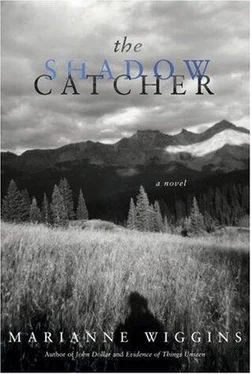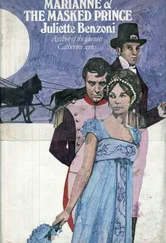No one could have been more gracious to Ellen than Amelia in her loyalty and optimism; but charity exacts an attitude of deference, regardless. It exacts a posture. Ellen shrank before their eyes. Especially after Raphael, her oldest child, picked up and lit out for the territory one cold night, taking nothing, leaving nothing but his past behind. No words were exchanged, no gratitude for his Existence, no short or long good-byes. Here one day; and gone the next. A family ghost. Sixteen, he was mourned by Ellen who enlisted Clara’s father in a search, but nothing ever turned up to explain where Raphael had gone. Seduced, abducted or kidnapped, he was never heard of again by any of the Curtises. Among them his name — that divine talisman of Johnson’s choosing that was supposed to be a blessing — was never spoken. And although Ellen took her son’s disappearance hard, and shrank at least an inch beneath the burden of its sorrow, she nearly lost another inch beneath Johnson’s next proposal. Maybe running from The Law but certainly running on empty and the surety that only prophets enterprise, Johnson wrote to Ellen to announce that he and Edward were headed West by train to make their fortune.
Where palm trees grow like cotton , he had written.
What a heartbreak, Clara thought.
What an ass, her father clarified.
Johnson swore that he had heard on good authority that there was gold in the Yukon and the prospects of that mineral had already left a trail of lucre all along the coast of the Pacific from California to the great Northwest — lumber money, shipbuilding, the fur trade. For decades now, a new Pacific city in the North had started gaining muscle. Seattle had supplied the timber that kept the Asia trade afloat. There was money to be made there, Johnson wrote. He and Edward would find a plot of land and build a house and send for Ellen and the other children within the year.
She had heard it all before.
She had heard it when he left her in Minnesota to go off and join God’s War against the South in ’62. Heard it when he wandered back, War’s demons in his eyes and in his ardor. Heard it when he took their second youngest son with him to vent his ardor on the unsuspecting Minnesota woods.
This wild talk of Johnson’s.
Always preaching to her about the blandishments of patience in a woman. About what waited in the future. As if her life on Earth were meant to be a single solitary wait. For what?
He had never even asked where Raphael had gone, or why.
If it hadn’t been for Clara’s mother, Ellen would have slipped into a long night, but Amelia kept her spirits up and kept her going, and then, miraculously, Johnson started sending letters as he’d never done before. His letters fueled Ellen’s and Asahel’s and Eva’s hopes. Whether falsely or not, it didn’t matter, Clara saw: there is no other quality of hope than that it floats a proposition. You can’t un hope a thing. To hope against a hope is still a form of hoping. Hope is something that’s the same thing as its opposite. It’s a thing that is the same thing as its shadow.
Seattle .
“So far away. But it must be a Christian place…” Ellen had attested to Amelia. “…if Johnson’s there.”
“I’m certain that it’s very civilized,” Clara could remember her mother consoling. “We hear they have the telephone. Very modern. And there’s a credible college there. With full female enrollment. Universal suffrage.”
Ellen’s facial muscles had pinched her mouth as she’d repeated, “… suffer -age?”
But as the boastful reports had continued to arrive from Johnson by the post it had been revealed that Seattle, itself, the city, the boomtown, was not, precisely, the current locus of the Curtis family’s hope. The land that had been purchased — ( God knows how , Clara’s father had remarked, perhaps enviously) — lay not near the inland channel but off-land, on an outer island, facing not the port nor the shipping lanes nor the city but, well, water . Facing the Orient. Or, if you were to draw a straight line: facing Russia. But Edward had cleared this tsarist-facing parcel and Edward had dug the foundation and Edward had quarried the stone for the hearth. Edward had planed the spruce trees and the cedar. Edward had raised the roof beams. Edward — who was in all ways except name Head-of-family — Edward had built them a house.
And out from St. Paul they had gone — Ellen, Eva and Asahel. By train. To the West. The North west. And Clara and Hercules and her mother and father had all trooped to the station to bid farewell and to watch them depart.
Four days on the iron roads.
Ellen had not lived with Johnson for eight years.
Edward had not seen his mother, sister nor younger brother for the same amount of time. Still, when Ellen, Eva and Asahel descended from the iron horse onto the rickety platform at Tacoma, the reunited family had fallen into one another’s arms.
Except Edward.
Who kept his mother at arm’s length.
The world at arm’s length, for that matter.
Eight years had cost him his youth. Vigilant, serious, silent, the twenty-year-old bore the burden of Johnson on his bones like those Chinese, coolies, he had glimpsed at Western depots, laying iron in the sun and the rain for The Railroad.
Now at last he could welcome these strangers, his family, as his own freeing agent. A way out. A blessed release from the thieving old man.
Asahel, who had stood only a yard high when he’d last seen him, was now an eager young man. Dark and compact like their mother, Edward’s brother was not as tall nor as fair-haired as he but they shared a singular trait: they were the good sons, the ones who had stayed under steady employment — one to the mother, the other to Johnson.
They were dutiful, decent.
They weren’t Raphael.
But Edward was already planning escape. He had built with particular care a room in the house for his parents. A matrimonial room, three times the size of the other two bedrooms, same size as the kitchen. He had bought them, with his own wages, a bed. And a glazed-tile wood-burning stove he bartered off a Norwegian.
Give them a few weeks. Settle them in. Teach Asahel what he needed to know of the region.
Then he’d be off.
On his own.
Come and give us a smile, Ellen had begged him. She seemed shocked at the sight of her husband, half the size of his former self but still gamey, wild-haired and fierce for her flesh. Johnson had clawed through their first night together in the new bed and was dead of paroxysms of ardor and bile the next day.
Martyr , Clara’s mother had sighed when she’d learned of his death.
Ass , Clara’s father repeated.
The Curtises, now only four, seemed to fall off the map. Washington Territory was far away, as far away in her family’s imagination as China or Rome. Amelia sent a steady stream of energetic newsy letters because that’s the sort of person that Amelia was but Ellen’s replies were grim and slim and never more than one page long. She had, indeed, found a Christian community armed and ready to embrace her out in Washington Territory (Latter Day Saints? Seventh Day Adventists? Amelia couldn’t tell the differences among the tribes) and she was entreating a reluctant God to help find Eva a prospective husband. “I imagine Clara has young wolves aplenty huffing at your door,” she speculated. “Such a pretty thing.” Pretty, yes, Amelia agreed, herself, on reading this. There were wolves, certainly, on Clara’s trail but she wasn’t interested in them. Her “engagements” were of a different kind — one month the study of Dutch still-life artists, one month the Florentines, another month the history of ancient glass, two months believing she should pursue a career in nursing. There were many St. Paul girls of Clara’s age among the people they knew who evidenced this flittiness, an energetic brief commitment to a cause, girls who seemed to bat the air in optional directions as butterflies bat the air to stay alive. They would do this, they would do that — it was fatiguing to observe. But what passed for a joyous exercise, a struggle to be free of conventional constraints and expectations, was really only the final throes of a struggle to the death for most of Clara’s contemporaries. Matrimony clipped their wings. Marriage was to be their grand career. Childbirth their creative act. But Clara took her parents’ marriage for her own ideal — a lifelong flirtatious conversation, a prolonged engagement — and the young men she had met in St. Paul all seemed to lack the necessary humor, the off-handed heroism required by a life forged between two besotted equals. She would have forgone the equality of a prospective match, the balance in the equation, if there had been some Zeuses at her door disguised as bulls or swans but all she got were eager boys with knobby throats whose idea of a life “in commerce” meant not a life in married harmony, but working at a bank. She wanted what her parents had — the loving touches, the mutual obeisance, the lingering in bed in morning, the open door to friends whose married lives were less than perfect, less ideal than her own parents’, to whom everybody turned in times of conjugated crisis. Why should she look beyond her home for happiness when happiness was there? Why should she marry? It seemed neither perverse nor unreasonable that she should choose to stay at home at an age when other girls were courting futures for themselves. And if it took her an extra year or two to determine what was right for her — it would be nursing, she had finally decided — why should she hurry toward decisions that could, ultimately, alter the shape of her entire life? But she should have seen the signs. In hindsight, she should have seen the shadow of a worry on Amelia’s face when Clara announced she would seek acceptance at St. Paul’s Women’s Nursing Academy in September. Of course you must, darling. You must , Amelia had enthused. Never asking about cost, as other parents might have done. Waving off discussion of tuition. Letting every talk of money go unspoken.
Читать дальше











